In today’s digital landscape, having a well-maintained website is crucial for any business or organization. Regular website maintenance not only ensures that your site runs smoothly but also protects it from potential threats. Just like a car requires regular check-ups to function effectively, your website needs ongoing attention to stay secure, perform optimally, and deliver a positive user experience.
Benefits of Regular Website Maintenance
- Enhanced Security
Regular maintenance is essential for bolstering your website’s security. Outdated software, plugins, and themes can create vulnerabilities that hackers can exploit. By consistently updating your site, you significantly reduce the risk of a security breach and protect sensitive data from falling into the wrong hands. - Improved Performance
A well-maintained website performs better. Routine checks and optimizations help to identify slow-loading pages, broken links, and other issues that could frustrate users. When your site runs smoothly, visitors are more likely to stay longer, engage with your content, and ultimately convert into customers. - Search Engine Optimization (SEO)
Search engines prioritize websites that are frequently updated and provide quality content. Regular maintenance not only improves your site’s functionality but also keeps it fresh, which can positively impact your search engine rankings. This is critical in driving organic traffic and improving your visibility online. - User Experience
A seamless user experience is vital for retaining visitors. Regular maintenance helps ensure that your website is easy to navigate, visually appealing, and free of errors. A user-friendly site enhances customer satisfaction, encourages repeat visits, and boosts conversion rates.
Consequences of Neglecting Maintenance
Neglecting regular maintenance can have significant negative impacts on your business, including:
- Increased Risk of Hacks
A website that isn’t regularly updated is a prime target for hackers. They often exploit outdated software, themes, and plugins to gain access to sensitive information. A successful breach can lead to data theft, loss of customer trust, and financial losses. In some cases, businesses may need to engage in hacked website repair to recover from such incidents. - Poor User Experience
If you don’t regularly check and update your website, you risk frustrating your visitors. Broken links, slow-loading pages, and outdated content can make it difficult for users to find the information they need. This leads to high bounce rates, where users leave your site quickly, and can severely impact your conversion rates. - Lost Revenue
Every moment your website is down or malfunctioning translates to potential lost sales. Customers expect a seamless experience; if they encounter issues, they may turn to competitors. Furthermore, if your website is hacked, the downtime required for repairs can also result in lost income. - Negative Impact on SEO
Search engines like Google penalize sites that provide a poor user experience or lack fresh content. If your website is not well-maintained, it may drop in rankings, making it harder for potential customers to find you online. This can lead to a significant decline in organic traffic. - Damage to Brand Reputation
A hacked or poorly functioning website can severely damage your brand’s reputation. Customers who experience issues may share their frustrations on social media or review platforms, which can deter new visitors. A tarnished reputation is hard to rebuild, making proactive maintenance essential.
Creating a Maintenance Plan
A well-structured maintenance plan is essential for keeping your website secure and functional. Here are key takeaways to consider:
- Establish a Maintenance Schedule
- Daily: Monitor performance and security.
- Weekly: Update software, run backups, and check for broken links.
- Monthly: Review content relevance and analyze SEO metrics.
- Quarterly: Conduct comprehensive security audits and test site responsiveness.
- Utilize Maintenance Tools
- Use plugins like UpdraftPlus for backups and Wordfence for security monitoring.
- Tools like Google PageSpeed Insights help analyze and improve site performance.
- Create a Backup Strategy
- Schedule regular backups and store them in multiple locations for quick recovery.
- Document Your Plan
- Outline maintenance tasks, their frequencies, and responsible individuals to ensure accountability.
- Review and Adjust
- Regularly evaluate your plan based on website performance and evolving business needs.
Conclusion
In conclusion, regular website maintenance is not just an option; it’s a necessity for any online presence. When considering ways to enhance your online visibility, creating a structured online presence is crucial. One effective approach is to develop a comprehensive business Directory.
By prioritizing maintenance, you can enhance your site’s security, improve performance, and ensure a positive user experience. Don’t wait for a crisis to address these issues; make website maintenance a part of your routine to safeguard your digital assets and drive long-term success.


